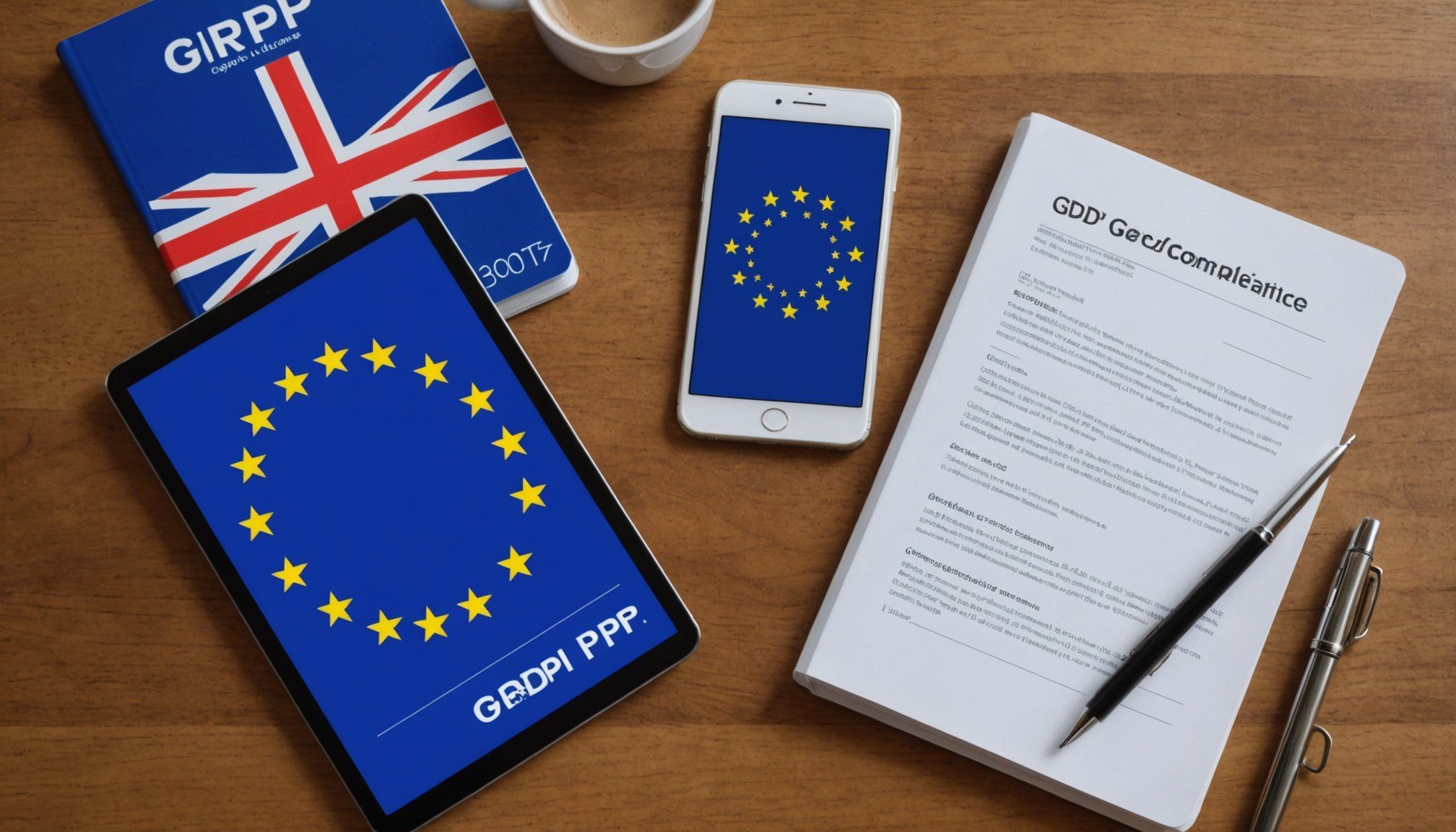Overview of GDPR Principles
Understanding GDPR principles is crucial for navigating the landscape of data protection and privacy rights. This framework ensures that personal data processing remains lawful and transparent, safeguarding individual privacy.
Core Principles
The General Data Protection Regulation (GDPR) establishes seven key principles: lawfulness, fairness, transparency, purpose limitation, data minimisation, accuracy, storage limitation, and integrity and confidentiality. These principles dictate how data should be handled, demanding organisations to process personal data fairly, ensure it is accurate, and maintain its security.
Also to discover : Key legal considerations for uk businesses setting up direct debit payment systems
Importance of Data Subject Rights
Data subject rights are at the heart of GDPR. These include the right to access personal data, the right to rectification, and the right to erasure. Individuals can also restrict or object to processing, ensuring control over their personal information. These rights empower individuals to protect their privacy actively.
Relationship with UK Data Protection Laws
GDPR principles are influential globally, and have shaped UK data protection laws, like the Data Protection Act 2018. This ensures that post-Brexit, UK citizens retain robust privacy protections. The UK’s alignment with GDPR principles demonstrates a commitment to maintaining high standards of data protection and privacy rights, reinforcing the nation’s role in the global discussion of data privacy.
This might interest you : Ultimate guide to navigating patent protection: key legal steps for uk businesses
Key Compliance Steps for UK Companies
Understanding the key compliance steps is crucial for UK companies aiming to meet their GDPR obligations. Highlighted here are vital measures, ensuring robust data protection practices.
Conducting a Data Audit
Kickstart your compliance journey with a comprehensive data audit. This involves identifying, mapping, and documenting all data flows within your organisation. A thorough audit verifies that data processing aligns with GDPR principles, helping to pinpoint potential vulnerabilities.
Appointing a Data Protection Officer
If your data processing activities are extensive, appoint a dedicated Data Protection Officer (DPO). A DPO guides the company through complex GDPR requirements, ensuring continuous compliance monitoring. Their role is crucial in advising on data protection impact assessments and facilitating communication with regulatory bodies.
Implementing Privacy Policies
To meet GDPR obligations, establish airtight privacy policies. These policies should describe data processing practices clearly. Craft transparent privacy notices to inform stakeholders about data collection and usage. This transparency builds trust and demonstrates commitment to protecting personal data.
- Identify and map data flows
- Establish a data protection framework
- Craft transparent privacy notices
By adhering to these compliance steps, companies not only avoid penalties but also enhance their standing in data protection. Embracing these practices equips organisations to safeguard sensitive information effectively.
Legal References and Framework
Navigating the legal requirements of the GDPR can be challenging for UK businesses, especially in the aftermath of Brexit. Key GDPR articles still apply, albeit with certain modifications. Regulation (EU) 2016/679, known as GDPR, introduces comprehensive measures to safeguard data. Post-Brexit, UK GDPR mirrors EU regulations with slight differences tailored to fit the UK’s legal landscape.
One pivotal aspect of UK GDPR is understanding the distinct compliance obligations. For instance, while core principles like lawfulness, fairness, and transparency remain unchanged, UK entities must ensure data transfers to and from the EU are lawful. For businesses, this means reassessing data flow mechanisms and implementing standard contractual clauses where necessary.
The Information Commissioner’s Office (ICO) plays a crucial role in overseeing compliance. It provides guidance, enforces regulations, and can impose fines. For businesses, the ICO is a valuable resource for compliance tools and advice.
Small changes, like references to domestic law rather than EU law, require attention. Familiarising oneself with ICO resources can simplify GDPR navigation. Understanding how GDPR articles influence UK businesses can ensure compliance and protect organisations from potential penalties. This creates a robust framework for compliant data handling and processing practices.
Penalties for Non-Compliance
In the landscape of data privacy, non-compliance with the General Data Protection Regulation (GDPR) can result in significant consequences. Organisations face potential penalties in the form of hefty GDPR fines and rigorous enforcement actions.
The GDPR establishes two tiers of fines. The first tier can impose penalties up to €10 million or 2% of the company’s annual worldwide turnover, whichever is higher. The second, more severe tier may result in fines reaching €20 million or 4% of annual global turnover. These substantial financial consequences highlight the importance of strict adherence to GDPR regulations.
Exploring real-world examples, we can assess the serious repercussions of non-compliance. In 2019, a breach incident led to a €50 million fine against Google for lack of consent transparency. Meanwhile, British Airways was subjected to a substantial penalty of £20 million after a cyber attack compromising personal data.
Adhering to GDPR is crucial not only to avoid these financial losses but also to maintain data integrity and consumer trust. Organisations must prioritise compliance to safeguard their operations against potential legal repercussions. The stringent enforcement framework of GDPR underscores the commitment to protecting personal data across the European Union.
Practical Tips and Checklists
Designing a GDPR compliance checklist is vital for maintaining lawful data handling within an organisation. It acts as a roadmap to ensure all data privacy obligations are met. This involves documenting data flows, assessing data protection risks, and ensuring data processing agreements are up to date.
Creating a GDPR Compliance Checklist
A comprehensive GDPR checklist should include several steps. Start by identifying what personal data you process and for what purpose. Next, establish lawful bases for processing personal data. Ensure transparency by updating privacy notices. Additionally, implement data protection policies that address security measures and how data subjects can exercise their rights.
Training Staff on Data Privacy
Staff training is a cornerstone of practical compliance tips. Regular sessions must cover best practices in data handling and illustrate real-life scenarios involving data breaches. Use engaging methods like workshops or e-learning modules to ensure retention and application of knowledge by employees. Emphasise the importance of reporting suspected breaches immediately.
Regular Compliance Reviews
Consistency is key in compliance. Conduct regular reviews, at least annually, to ensure all protocols remain relevant. Document findings and update policies accordingly. Use these reviews to assess any changes in data processing activities or legal requirements. Include checklists for thoroughness and accountability in the review process.
Case Studies of UK Companies
Examining case studies of UK companies offers valuable insights into effective GDPR implementation strategies. These business examples illustrate how compliance can be achieved and sustained, benefiting both organisations and their clients.
One prominent example is a large financial firm that identified GDPR as an opportunity to enhance customer trust. By investing in comprehensive training programmes for employees, they achieved compliance while significantly improving data protection practices. This case highlights the importance of staff education in mastering GDPR requirements.
Another UK tech company faced initial struggles with data mapping, a common GDPR challenge. Through persistence and the adoption of sophisticated data management tools, the company streamlined its processes and fostered a culture of transparency. This demonstrates how technology can be leveraged to overcome regulatory hurdles.
Lessons learned from these experiences emphasise the necessity of a structured approach and diligent monitoring. Companies who navigated GDPR challenges successfully often adopted:
- Regular audits to ensure ongoing compliance
- Cross-departmental collaboration to cover all data-related aspects
- Clear data breach response plans
Drawing from these best practices, businesses can confidently address GDPR compliance by fostering a proactive and informed organisational ethos. Real-world applications of GDPR compliance serve as a blueprint for organisations striving to meet legal obligations effectively.











